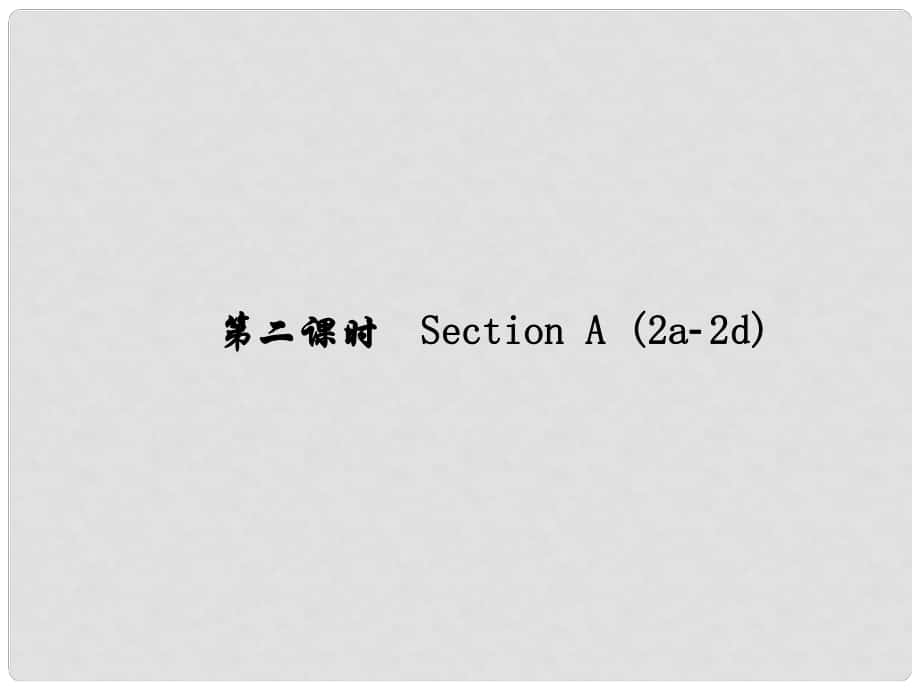《原(浙江專版)七年級(jí)英語(yǔ)下冊(cè) Unit 2 What time do you go to school(第2課時(shí))Section A(2a2d)課件 (新版)人教新目標(biāo)版》由會(huì)員分享���,可在線閱讀�����,更多相關(guān)《原(浙江專版)七年級(jí)英語(yǔ)下冊(cè) Unit 2 What time do you go to school(第2課時(shí))Section A(2a2d)課件 (新版)人教新目標(biāo)版(8頁(yè)珍藏版)》請(qǐng)?jiān)谘b配圖網(wǎng)上搜索���。
1����、第二課時(shí)第二課時(shí)Section A (2a2d)Section A (2a2d)【辨析】job與work兩者作名詞用�,都可表示“工作”,但二者用法有區(qū)別�。job指具體的職業(yè)或零工,為可數(shù)名詞��,復(fù)數(shù)形式為jobs�;work指人們?nèi)粘I詈凸ぷ髦袕氖碌捏w力或腦力勞動(dòng),為不可數(shù)名詞����。“一件工作”應(yīng)用“a piece of work”�。eg:He has a job at the school.他在學(xué)校里有份工作。I have a lot of work to do today.我今天有許多工作要做��。work還可作動(dòng)詞,意為“工作”����。eg:work at school在學(xué)校工作go to work去上
2�、班from.to.“從到”,可以表示“從某時(shí)到某時(shí)”���,也可表示“從某地到某地”�����。eg:from seven oclock to ten oclock 從七點(diǎn)到十點(diǎn)from Beijing to Shanghai 從北京到上海in the morning在早上at night在夜里【注意】at常用在表示某一具體時(shí)刻的名詞前���;in常用在年、月����、季節(jié)、世紀(jì)及表示泛指的上午��、下午或晚上的名詞前�����;on常用在表示星期幾或具體某一日及某一日的上午、下午或晚上的名詞前����。exercise用法小結(jié)作動(dòng)詞,意為“鍛煉�����;練習(xí)”���。作可數(shù)名詞��,特指“一套動(dòng)作�,訓(xùn)練活動(dòng)”或表示“習(xí)題”�。eg:do morning exer
3、cises做早操作不可數(shù)名詞�����,泛指“運(yùn)動(dòng)”�����。be late for. 遲到 一�、根據(jù)句意及首字母或漢語(yǔ)提示完成單詞���。1My mother often gets up in the morning.2Twenty and twenty is 3Lets meet at the train .4The students usually (鍛煉) in the morning. So they are healthy.5She (從不) eats breakfast at home.early forty station exercise never 二、用方框中所給單詞的適當(dāng)形式填空��。6John
4��、tells us a story.7Helen always gets up at six in the morning.8What time do you usually go to bed at ?9These are for strong(強(qiáng)壯的) men.10I cant finish ten in an hour.funny fifty night jobs exercises 三�、單項(xiàng)選擇�����。( )11._ do they get dressed?_ seven thirty.AWhat���;At BWhat time����;On CHow�;At DWhat time;At( )12.I re
5�、ad English _six oclock _six thirty every morning.Afrom; at Bfrom; toCat;at Dat; to( )13.Bob doesnt like strawberries���,so he _ eats it.Aalways Busually Coften Dnever( )14.She usually gets up _ six _ the morning.Aat�;in Bon;at Cto���;with Dat���;onD B D A 四、句型轉(zhuǎn)換��。15Tony works at_a_bus_station(對(duì)畫(huà)線部分提問(wèn)) Tony ?16Sara goes to school at 7:30.(改為否定句)Sara to school at 7:30.17John takes a shower at 7:00.(改為一般疑問(wèn)句) a shower at 7:00?18I usually go to work at 9:00.(用she代替I改寫(xiě)句子)She usually at 9:00.Where does work doesnt go Does John take goes to work
 原(浙江專版)七年級(jí)英語(yǔ)下冊(cè) Unit 2 What time do you go to school(第2課時(shí))Section A(2a2d)課件 (新版)人教新目標(biāo)版
原(浙江專版)七年級(jí)英語(yǔ)下冊(cè) Unit 2 What time do you go to school(第2課時(shí))Section A(2a2d)課件 (新版)人教新目標(biāo)版

